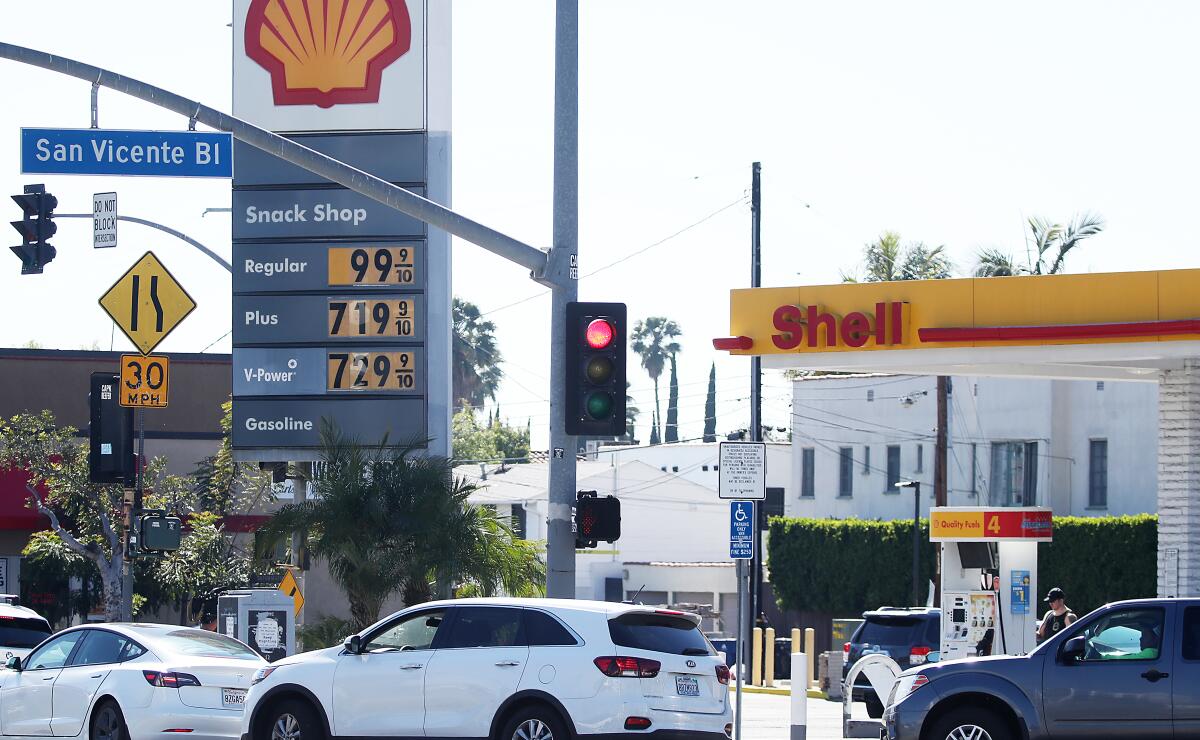At the gas pump, Americans want to fight Putin but worry about the pain

- Share via
Joel Mendoza hasn’t been closely following the conflict in Ukraine, he said, but he does know one thing: Gasoline is now very expensive.
The 35-year-old Koreatown resident said it’s “very sad” to see what’s happening, especially the effects on the children in Ukraine; he has a 10-year-old daughter. But the reality for him is that it will soon become unsustainable to run his mobile washing business if the price of gas keeps going up.
As the conflict in Ukraine intensifies and images of soldiers and war-torn villages stream out of the besieged country, international condemnation of Russia’s invasion has grown. For most Americans, however, the most tangible impact of the war is the cost of gasoline.
Prices had already been climbing because of supply-chain issues during the pandemic, but they’ve spiked even higher in the last month.
With President Biden’s announcement Tuesday that the U.S. would be banning imports of Russian oil, liquefied natural gas and coal, prices won’t be coming down anytime soon, as Americans grapple with the pain of the Western world’s unprecedented economic campaign against Russia.
Politicians are willing to pay the price of supporting Ukraine, and a broad swath of Americans appear to be, too.
According to a Reuters/Ipsos poll released Friday, 62% of Americans believe it is worth paying more for fuel and gas because of sanctions against Russia in order to defend another democratic country — an increase from 49% two weeks ago.
And 71% of Americans say they would support a ban on Russian oil, even if it means higher gasoline prices in the United States, according to a Quinnipiac University national poll released Monday.
Ardavan Mobasheri, a lecturer of economics at the University of Richmond, said the polling shows that most Americans want to do what’s “ethical and moral,” but it’s important to see if those attitudes hold if prices continue to rise.
“There’s a sense of willingness of people to want to sacrifice,” Mobasheri said. “But then the big question is, when they actually feel the sacrifice, whether they are willing to go with it.”
Joe Kelly, a 23-year-old software engineer, pointed out that U.S. gas prices are “already at a discount compared to the rest of the world.”
While Tuesday’s average price for a regular-grade gallon of gas in the U.S. was $4.17, according to the American Automobile Assn.’s price tracker, many European countries are paying $7 to $8 or more.
As he filled up his SUV at a Mobil on Beverly Boulevard and Western Avenue, Kelly said he’s in a situation where he can afford an increase in gas prices. He’s supportive of the sanctions against Russia, because “you can’t just invade a sovereign nation and not face any consequences.”
But at a 76 gas station on Pico Boulevard, as Mendoza filled up his Dodge Ram and the several gasoline containers needed to fuel his equipment, he could only shake his head.
“It’s been around $100 every, every, every day,” Mendoza said. “It’s, like, no way to do business.”
He would need to raise his prices to make up for the cost of gas, but his customers aren’t willing to pay more, he said.
In California, the average price of a gallon of regular-grade gasoline Tuesday was $5.44; it was even higher in Los Angeles County, at $5.51, according to the AAA.
“As gas prices remain high and potentially go even higher, and we actually begin to feel those numbers hit our pocketbook, expect to see [public support] drop over time,” Mobasheri said.
Several Angelenos who depend on driving for a living say they already can’t keep up with the price increase.
Monique Murphy, an Uber driver, pointed to the screen of the fuel pump she was using at a Chevron on Vermont Avenue: $8 for 1.43 gallons. She can’t afford any more at the moment.
That much gas will get her about 48 miles in her Ford Fiesta, which amounts to 60 to 90 minutes of Uber driving. Throughout the course of one day, she usually stops to refuel three times.
“I try to manage the gas,” she said. “I don’t ever fill up, because I don’t know if I’ll get that back.”
At current gas prices, Murphy makes around $50 a day, she said. Just a month ago, she was making $130 a day.
Murphy said she “doesn’t really understand what’s going on” in Ukraine but doesn’t think Biden’s ban on Russian oil is a good idea.
“Lot of people going to start losing their jobs and stuff,” she said. She has a 3-year-old to support and doesn’t know how much longer she can continue driving for Uber at current rates.
Felipe Zeelya, who does gardening work, is already considering stopping his business.
He used to spend about $280 a month on gas, but it was about $360 last month, he said. While he appreciates efforts in support of Ukraine, the 60-year-old is more focused on making a living.
“It’s not that I don’t care,” he said. “Problem is, I care more about gas.”
For Steve Molina, who lives in South L.A., paying a little extra for gas is something he can tolerate.
“I think if that’s the price for the U.S. to support Ukraine, a little extra money … you can’t put a price on life,” Molina said. The 40-year-old works from home as a market analyst.
“It’s inhumane,” he said of Russia’s unprovoked attack on the former Soviet republic.
Abe Hagigat, an insurance agent, said the price of gas is nothing compared to the price of war on Ukrainians, as he filled up his Nissan before returning to work.
“You just have the inconvenience of paying a few more bucks every time you fill up your tank,” Hagigat, 65, said. “It’s a sacrifice we can make.”
More to Read
Sign up for Essential California
The most important California stories and recommendations in your inbox every morning.
You may occasionally receive promotional content from the Los Angeles Times.














